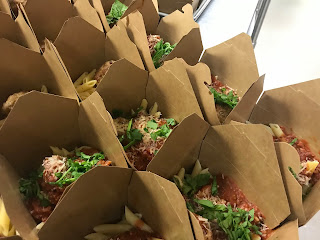 |
| Common Threads AmeriCorps Food Educator Grace McElhone harvests carrots from the Whatcom Middle School hoophouse for food distribution during COVID-19 school closures. Photo source: Common Threads |
The grants support activities connecting students with local farmers, school gardens, and agriculture education during the coming school year.
The financial support comes at a critical time for educating and feeding students with locally grown foods. It also highlights farm to school programming that has taken place for many years in classrooms, gardens, and cafeterias at school districts across Washington State.
Efforts connected regionally and statewide
Though the grants are spread across the state, many partners plan to work collaboratively to increase the impact of their individual projects and build broader momentum for farm to school activities.
They also share a common connection to WSDA Farm to School, which has provided guidance, assistance, or encouragement to these programs to support their success.
In addition, some organizations are members of the Washington State Farm to School Network, launched by WSDA Farm to School and dozens of other organizations in 2018 (also thanks to the support of a USDA Farm to School Grant).
WSDA looks forward to the seeing successes and benefits of these projects for students, farmers, and communities in the coming years, and supporting many of the projects through our WSDA Farm to School programming.
Washington’s award recipients include:
Chimacum School District 49, Chimacum
Chimacum School District, in partnership with the nonprofit Community Wellness Project and the local food and farm community, will increase the amount of fresh and local food procured, prepared and served in school cafeterias. The project will increase school meal participation, agricultural education, food and farm career and technical education programs, and develop a school food waste composting program in partnership with a local farm.
Common Threads, Bellingham
The project will enhance existing farm to school partnerships with staff at six rural schools and build new partnerships with four additional high-need rural schools. The project will work with district and school staff to increase understanding of and support for farm to school; and offer support to rural and high poverty communities across Washington state via training, consultation and the recruitment, training and support of food educators in partnership with OSPI, WSDA, the Washington State Farm to School Network, and Whatcom County Health Department.
Coupeville School District, Coupeville
 |
| Coupeville School District take-home meals featuring pasta and Washington grown beef sauce for distribution during COVID-19 school closures. Photo source: Coupeville School District |
Viva Farms, Burlington
The project will increase procurement of local produce and whole grains in schools through training, technical assistance and connecting farmers and school buyers; engage students and teachers in experiential learning and educational activities related to agriculture, food and nutrition; and increase understanding and support for farm to school with regional school district leadership. Partners include WSU Skagit County Extension, Mt. Vernon School District, Skagit/Island Head Start, WSDA and University of Wisconsin.
Northeast Washington Educational Service District 101, Spokane
The Northeast Washington Educational Service District 101 (NEWESD 101) Child Nutrition Cooperative will work with Empire Health Foundation to help plan farm to school activities at rural school districts in Northeastern Washington. The project will establish a supply chain linking regional farmers and ranchers to school districts, introduce seasonal menus that incorporate local food items, and further agricultural education and introducing school garden projects.
Okanogan Conservation District, Okanogan
 |
| Students Students at a fall garden party at Virginia Grainger Elementary in Okanogan, compare sunflower Photo source: Okanogan Conservation District |
Washington State Department of Agriculture, Olympia
Washington State Department of Agriculture (WSDA) and a team of trainers will develop and deliver three "scratch cooking & farm to school institutes" in Washington State for cross-disciplinary district teams, including one training by and for tribal schools and meal programs. The institutes will consist of two-day intensive training and planning sessions for schools to implement scratch cooking programs and local procurement. The project aims to increase the use of minimally processed, locally produced ingredients, traditional and culturally relevant menus, and student participation in meal programs.
For a comprehensive list of the grants awarded nationwide, visit USDA 2020 Farm to School Grantees webpage.
